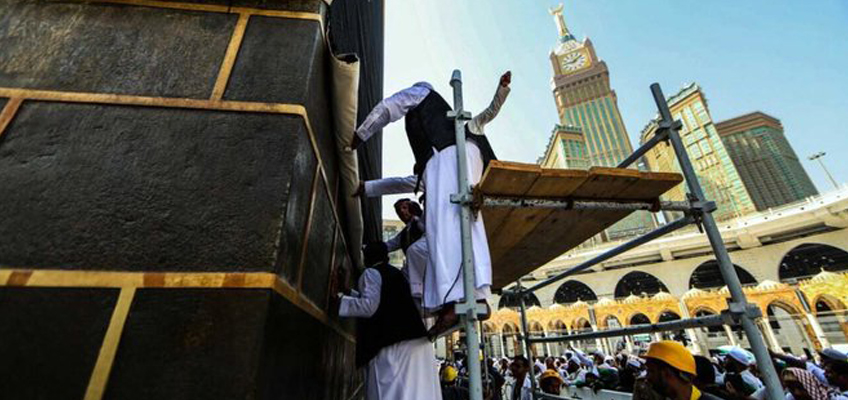Hajj and 'Umrah
Kaaba kiswa raised indicating beginning of Hajj season
Following the annual custom, the lower part of Kaaba garment (kiswa) was raised and tailors covered the exposed part with a white cotton cloth of about two meters across the four sides.
This procedure is carried out every year as a precautionary measure to prevent people from damaging the kiswa, as they tend to touch the cover during their circumambulations, said Dr. Muhammad Bajouda, director of the King Abdul Aziz Complex for the Kaaba.
The covering of the Kaaba is raised each year as a sign of the beginning of the month of the Hajj.
The kiswa was previously raised on the first day of Dhu Al-Hijjah as an announcement of the advent of the rite and an indication of the beginning of the holy days.
According to Bajouda: “With a decrease in the number of pilgrims, the date of raising the kiswa was put forward, as the numbers were very few and it was difficult for many pilgrims to come in those years.” But with the improvement of economic conditions and means of transport, the date was changed to the middle of Dhu’l-Qi’dah.
He pointed out that the number of pilgrims, which exceeds 2 million, is one of the reasons for raising the kiswa — to preserve it.
“The kiswa is raised from the mataf the equivalent of three meters out of the 14-meter height of the Kaaba. Eleven meters remain covered until the 12th of the month of Muharram.” Bajouda said.
This period passes by changing this cover once a year, during the Hajj season, on the morning of the day of Arafah, the ninth of Dhu Al-Hijjah, to return the covering of the Kaaba until the 12th of Muharram.
“On the eighth day of the month of Dhu Al-Hijjah every year, the 52 gilded parts are removed,” he said.
Source: Arab News


 WhatsApp us
WhatsApp us